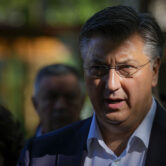 LUXEMBOURG (CN) – Tech giant Apple and Ireland took their fight over a $14 billion tax bill from the European Union to the European General Court on Tuesday, the first volley in the EU's war on sweetheart tax deals for multinational corporations.
LUXEMBOURG (CN) – Tech giant Apple and Ireland took their fight over a $14 billion tax bill from the European Union to the European General Court on Tuesday, the first volley in the EU's war on sweetheart tax deals for multinational corporations.
The hearing at the EU’s second-highest court took place before a full courtroom, with court officials opening a second room with a live stream to accommodate the interest. The lawyers for the parties involved all gave opening statements, starting with Ireland, who opened aggressively against the European Commission.
“Ireland has been the subject of entirely unjustified criticism,” said Paul Gallagher, the former Irish attorney general. “It is the commission that should be criticized.”
Ireland is represented by a team of six Irish barristers led by Gallagher. The legal team has, so far, cost the Irish taxpayer nearly $8 million.
According to Ireland, Apple should only pay taxes based on profits created within the country, not on worldwide profits. Apple maintains that its research and development is conducted in the United States thus profits on its intellectual property should be beyond the Irish tax authorities.
The case stems from a 2016 tax bill from the commission following a two-year investigation by competition commissioner Margrethe Vestager. Vestager said two tax arrangements between Apple and the Irish government, one in 1991 and another in 2007, amounted to state aid – when a government provides a beneficial financial arrangement to certain company or industry.
Vestager found "Ireland granted illegal tax benefits to Apple" and ordered Apple to pay Ireland the largest fine in EU history. Ireland, however, didn’t want the $14 billion windfall and appealed to the European General Court.
U.S.-based multinationals operate 25 of the 50 largest companies in Ireland and pay an estimated 80% of all Irish corporate tax.
Meanwhile, the small landlocked country of Luxembourg – where the EU courts are located – has also joined with Apple and Ireland in arguing against the ruling. Luxembourg has an advantageous tax system for multinationals and has had its own run-in with the commission: Amazon was ordered to pay the country nearly $277 million in back taxes in 2017.
Apple, represented by Daniel Beard of Mockton Chambers, defended his Cupertino, California-based client by claiming “Apple is the largest taxpayer in the world” and accused the commission of retroactively applying changes to tax law.
The tech giant launched its most expensive smartphone, the iPhone 11, four days before the start of the hearings.
Following a short break, the court then heard oral statements from commission attorney Paul-John Loewenthal, who in a languorous tone explained how tax rates are established and what their purpose is.
“It is presumed that if a tax authority makes an arbitrary ruling that is beneficial for an enterprise, that ruling constitutes state aid,” he said.
Carsten Zatschler, representing the European Free Trade Association, summed it up a bit more succinctly during his statement: “The tax benefits are why Apple is in Ireland.”
The association is a trade organization representing Iceland, Liechtenstein, Norway, and Switzerland. Poland has also joined the fray.
Debates about advantageous national tax schemes are common in the European Union and this is the first case to seriously tackle tax policy as a competition issue. The EU is currently considering implementing a harmonized corporate tax rate across its 28 member states.
After lunch, the hearing resumed in front of a substantially emptier chamber with questions from the 11-member panel of judges. Questions ranged from very specific queries about terminology to broad questions about why documents were lacking.
“We didn’t anticipate having this level of profits in 1991,” Beard, Apple’s attorney, said. “So we didn’t keep some records.”
In the late afternoon, the court took another short break. Judge Marc van der Woude asked the parties to focus their answers and, on behalf of the translators, to slow down. “In short, less and slower,” he said.
The final round of questions focused heavily where Apple recognized its profits and where it should have done so.
“In the beginning Apple told Ireland, ‘This [intellectual property] IP is outside of Europe, don’t worry about it.’ And the Irish government didn’t look into that at all,” said Loewenthal, the commission’s attorney. His comments throughout the hearing were frequently directed at Ireland, rather than Apple, highlighting the frustration his office has had with keeping EU member states from implementing advantageous tax schemes.
The hearing will continue Wednesday with closing statements from all parties.
Subscribe to Closing Arguments
Sign up for new weekly newsletter Closing Arguments to get the latest about ongoing trials, major litigation and hot cases and rulings in courthouses around the U.S. and the world.








